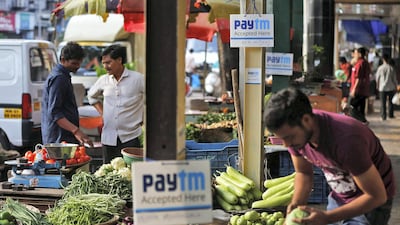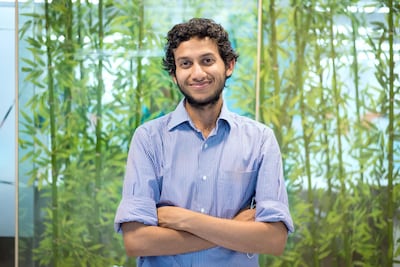The tech revolution and a growing culture of active corporate governance in India is leading to a shift in wealth creation in the country, as a new generation of self-made entrepreneurs are being catapulted to the rich lists, analysts say.
“The prominent business families in India have historically been India’s richest families,” says Nilesh Sambare, the founder of Jijau Social and Educational Trust. “But in the last few years, India has witnessed tremendous growth in its self-made billionaires.”
Among them are Vijay Shekhar Sharma, the founder of Indian digital payments company Paytm, who has a net worth of $2.7 billion (Dh9.9bn), according to Bloomberg, and Sachin Bansal and Binny Bansal, the founders of Flipkart, India's homegrown answer to Amazon, who each have a net worth of $1bn.
Mr Sambare explains that such entrepreneurs “are capitalising on the Indian economy’s high growth rate” and “due to technology advancement and new innovations by upcoming entrepreneurs, the traditional industrial families are losing their wealth from the dynasties”.
Anil Ambani is a case in point. He is the brother of Asia's richest man, Mukesh Ambani. The two brothers are the sons of Dhirubhai Ambani, who started Reliance Industries as a textiles business and grew it into one of India's largest conglomerates. But, while Mukesh Ambani's fortunes have soared, figures from Bloomberg reveal that Anil Ambani's total holdings in companies have plunged to about $120 million today from upwards of $31bn in 2008, dragged down by hefty debts and losses. Among the executive's woes, his telecom company Reliance Communications was declared bankrupt this month.
Vijay Mallya, the flamboyant former Kingfisher tycoon is another example. He inherited his father's empire and expanded it, but ended up with debts to the tune of more than $1bn following the collapse of Kingfisher Airlines in 2012. In the past, there was public anger in India because wealthy individuals are perceived as protected, to allow them to get away with otherwise illegal activities. But authorities have been proactively trying to get Mr Mallya extradited from London to face the justice system as the Narendra Modi government has been making significant efforts to crack down on the widespread problem of defaulters and clean up the huge burden of bad debts that have been plaguing India's banks.
This all comes as more and more people in India are becoming millionaires and billionaires. The number of millionaires in the country has surged by 30 per cent in the five years to 2018 to 326,052, according to the latest wealth report published by property consultancy Knight Frank. That number is expected to rise by a further 35 per cent over the next five years.
“India has witnessed a growth in wealthy individuals due to heightened economic activity,” says Shishir Baijal, the chairman and managing director of Knight Frank India.
The country is the world's fastest-growing major economy, projected to grow at 7.3 per cent in the current financial year to the end of March 2020, up from 7.1 per cent last year, according to the IMF.
Amid this growth, India is expected to see the biggest increase globally in the number of ultra-high net worth individuals – defined as those with wealth exceeding $30m - over the next five years, according to Knight Frank. It forecasts that the number of ultra-high net worth individuals will increase by 39 per cent to 2,697 by 2023.
As this wealth creation in the country continues, experts explain that there are traditional large businesses in the country that are struggling to keep up with the rapid technological changes.
“The business houses that grew in the industrial age but did not adapt to the digital age are bound to become redundant,” says Rajiv Talreja, an Indian business coach and the author of Lead or Bleed. “Most of these business houses leveraged wealth to create wealth. They borrowed heavily and invested in core industry rather than exploring segments which leveraged technology.”
He points out that industrialist business family conglomerates such as the Tata Group and Mukesh Ambani's Reliance Industries have been able to successfully adapt, with Tata launching its e-commerce venture Cliq, while Reliance stormed the telecom market with its Jio brand, and is also working on its own plans for a new e-commerce company.
Mr Talreja adds, “a lack of corporate governance can also be traced as a common factor in the fall of some of these business dynasties”.
Meanwhile, there has been what he describes as “a start-up revolution in India” which has changed the pattern of wealth creation in the business world.
“The success of start-ups like Flipkart, Paytm, Oyo Rooms and Swiggy has definitely created and inspired a new generation of self-made entrepreneurs in India,” he says.
Investors have also become more confident about banking on Indian start-ups, analysts say. Capital is being pumped into start-ups in India from the likes of Japan's Softbank and South Africa's Naspers. The country's large, young population is creating enormous opportunities for entrepreneurs.
Vijay Shekhar Sharma of mobile wallet company Paytm has managed to capitalise on the rapid expansion of smartphone use in India and the move towards digital payments.
The son of schoolteacher, he founded Paytm in 2011, which gained huge traction following the government's surprise demonetisation move in 2016, when India banned the two highest value banknotes. Paytm has more than 200 million active users in India. Last year, Warren Buffett's Berkshire Hathaway invested $300m in the company.
Mr Sharma, 40, at a conference organised by the All India Management Association last month, told the audience that he was fortunate because he was educated in an engineering college in New Delhi during the internet revolution.
“I was lucky to see the internet revolution sitting in India at a time when it was happening in the world,” he said. “As luck would have it, the rest of my work and career ended up becoming on the internet.”
PC Musthafa, a self-made millionaire, came from a poor background in the state of Kerala in south India, as the son of a daily wage labourer. He is the co-founder of what is now a $150m food products company called iD Fresh Food, based in Bangalore. Mr Musthafa says there has been a change in the culture in India, which is allowing people to focus on entrepreneurship rather than going into traditional careers. In turn, this is helping to bring about the shift in wealth creation.
“Society, family weren't considering entrepreneurship as something which an educated person should do,” he says. “I think things have changed a lot these days, in the last ten years or so. Now, society, families, and even the legality and government are supportive of start-ups. Things have improved a lot but there is still miles to go.”
Experts say that it is inevitable that new names will keep coming up as start-ups try to tap opportunities in India's fast-growing market, and there will be further destruction of wealth among traditional big business names if they do not manage to adapt.
“Businesses that are listening to the market and providing what the consumer needs will create wealth,” says Mr Talreja. “Businesses which do not adapt and reinvent will fall off the list.”


